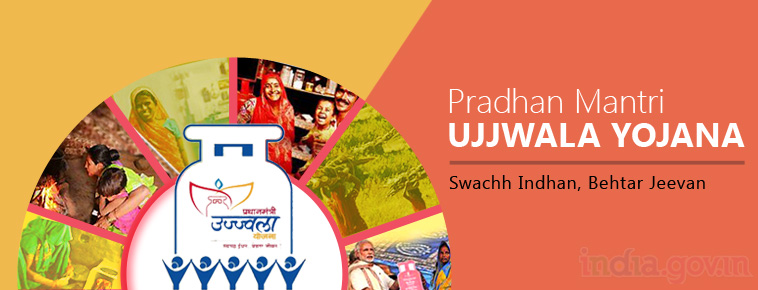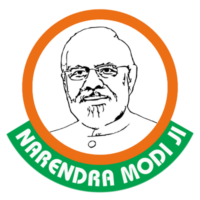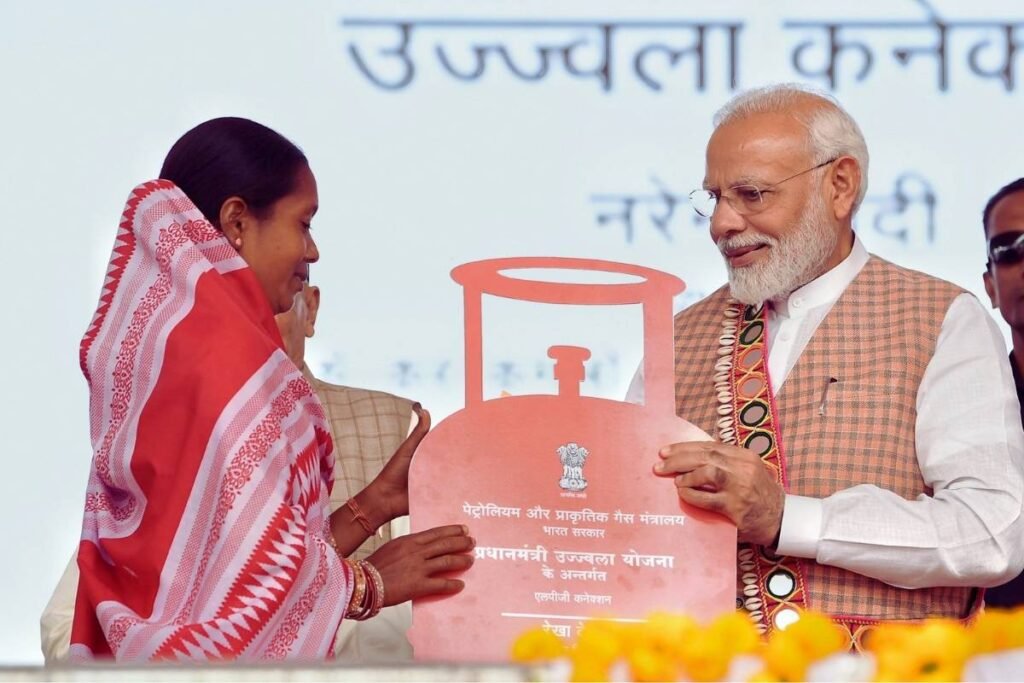
With the tagline “Swachh Indhan, Behtar Jeevan“, Union Government has launched a social welfare scheme “Pradhan Mantri Ujjwala Yojana” (PMUY) on 1st May 2016 under the leadership of Hon’ble Prime Minister Shri Narendra Modi.
The scheme envisages of smoke free Rural India and aims to benefit five crore families especially the women living below poverty line (BPL) by providing concessional LPG connections to entire nation by 2019. The scheme will increase the usage of LPG and would help in reducing health disorders, air pollution and deforestation.
Ministry of Petroleum & Natural Gas is implementing the scheme.
- Salient Features
- Objectivese
- Budget and Funding
- Implementation
- Eligibility Criteria
- Required Documentation
Salient Features
- Cabinet Committee on Economic Affairs (CCEA) approved Rs 8000 crore for the next 3 years.
- Pradhan Mantri Ujjwala Yojana will provide 5 crore LPG connections to BPL families, with the financial support of Rs 1600.
- Budget Speech of 2016 had announced about the scheme and made a budgetary provision of Rs 2000 crore in the current Financial Year (FY).
- Connections will be issued on the name of women beneficiaries.
- EMI facility will also be provided for stove and refill cost.
- It is complimentary to Prime Minister’s Give It Up campaign under which 75 lakh middle class and lower middle class households have voluntarily given up their cooking gas subsidy.
75 lakh additional LPG connections to be released in 3 years
It will take total number of PMUY beneficiaries to 10.35 crore
The Union Cabinet, chaired by the Prime Minister Shri Narendra Modi, has approved the extension of Pradhan Mantri Ujjwala Yojana (PMUY) for release of 75 lakh LPG connections over three years from Financial Year 2023-24 to 2025-26. Provisioning of 75 lakh additional Ujjwala connections will take total number of PMUY beneficiaries to 10.35 crore.
Key LPG details in 2014 vs 2023
| (Unit) | 01.04.2014 | 01.04.2016 | 01.04.2023 | |
|---|---|---|---|---|
| National LPG coverage | % | 55.90% | 61.9% | Near saturation |
| No. of Bottling Plants of OMCs | in Nos. | 186 | 188 | 208 |
| No. of LPG distributors in India | in Nos. | 13896 | 17916 | 25386 |
| Domestic Active LPG Customers in India | in Lakh | 1451.76 | 1662.5 | 3140.33 |
As per the existing modalities of Ujjawala 2.0, the first refill and stove will also be provided free of cost to Ujjwala beneficiaries.
A targeted subsidy of Rs.200 per 14.2 kg LPG cylinder for upto 12 refills per year is being provided to PMUY consumers. Without continuation of PMUY, eligible poor households may not be able to get their due benefit under the scheme.
Women’s ease of living through clean cooking
According to the World Health Organization (WHO), approximately 2.4 billion people worldwide (which is around one-third of the global population), rely on open fires or inefficient stoves fuelled by kerosene, biomass (such as wood, animal dung, and crop waste), and coal for cooking. This leads to harmful household air pollution, contributing to an estimated 3.2 million deaths annually in 2020, with over 237,000 deaths being children under the age of 5. Achieving a sustainable and pollution-free future requires addressing the issue of household air pollution, especially to prevent suffering among women and children.
In the past, impoverished communities in India, particularly in rural areas, used traditional fuels like firewood, coal and dung cakes without being aware of the adverse health effects caused by them. Consequently, they faced health problems without knowing the underlying cause. A heightened mortality risk due to illnesses such as pneumonia, lung cancer, ischaemic heart, and chronic obstructive pulmonary diseases is extensively reported. Non-renewable wood fuels for cooking cause a gigaton of CO2 emissions, and burning residential solid fuels comprise 58 percent of black carbon emissions. They are also a significant contributor to household air pollution (HAP) due to incomplete combustion of solid biomass.
Research also indicates that this is a gender problem: girls and women face increased exposure to solid fuels. Cooking with solid fuels delays progress towards five of the UN Sustainable
The PMUY scheme has empowered women economically and socially. With easier access to LPG, women are no longer burdened with the task of collecting firewood or other traditional fuels, which often required long and laborious journeys. This newfound convenience allows them to participate more actively in community life and take up other income-generating opportunities.
Furthermore, the Ujjwala scheme has contributed to enhancing the safety and security of women, as they no longer need to venture into isolated and potentially unsafe areas to collect firewood or fuel.
Initiatives to expand LPG coverage
1. PAHAL (Pratyaksh Hastantarit Labh): Instead of providing LPG cylinders at subsidized price, those were sold at market price, and applicable subsidy was directly transferred to individual’s bank account electronically. This reduced “ghost” accounts and illegal use of household cylinders for commercial purposes, ensuring that only the intended beneficiaries receive the benefits.
2. GIVE IT UP: Instead of removing subsidies forcefully, people were encouraged to voluntarily surrender their subsidies. Through extensive promotion, millions of people willingly gave up the subsidies, which helped redirect the funds to those who genuinely needed assistance in acquiring LPG cylinders.
3. During Covid-19 pandemic lockdown in 2020, free refill scheme under Pradhan Mantri Garib Kalyan Yojana was implemented. Under this scheme, assistance of Rs. 9670.41 Crore was given to PMUY beneficiaries in support of 14.17 Crore LPG refills.
4. Per capita consumption of PMUY beneficiaries which was 3.01 in 2018-19 has increased to 3.71 in 2022-23. PMUY beneficiaries took more than 35 Cr LPG refills a year now (2022-23).

